PREFACE: OOPS! On June 7, I accidentally posted an entry when I merely meant to update labels. Sorry about that!
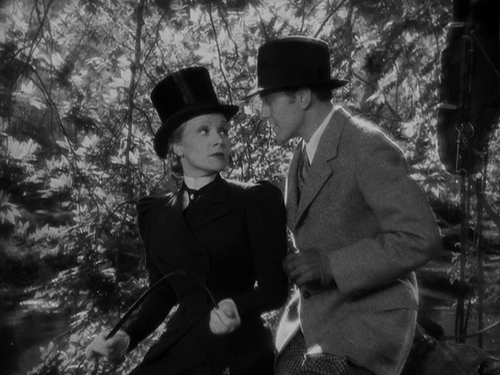 |
| The Song of Song's Lily may be bad, but she's perfectly good at it |
Thank you everyone who responded to
my Horseathon entry. A
few of you expressed surprise that horses appeared in so many
Marlene Dietrich
movies, and I didn’t even get halfway through her filmography! Picking up from
where I left off, I will elaborate on my third group of Dietrich movies, the
Europeans, but I'd like to hype some of the other topics I'll be raising this month. Between June 18-22, I'll participate in the second annual
Queer Film Blogathon, hosted by
Garbo Laughs. Last year, I wrote an entry in which I began to articulate thoughts that had been vague considerations in my head about the
homophobia in Maria Riva's book. Whether I address a similar topic or examine Dietrich's movies, I'm not sure. Another topic that I have put on the back burner pertains to
Greta Garbo. I plan to write a Dietrich vs. Garbo series by pitting their movies against each other, and you can expect at least one such post some time this month because I have folders brimming with
Dishonored and
Mata Hari screen captures that I'd like to delete from my hard drive. Now, let's race through the topic at hand. . . .
Europeans
Even though vicious gossips would have you believe that
Dietrich was born in 1901 and made several movies before The Blue Angel, true
fans know this to be impossible. Dietrich was far too young in the ‘20s to star
in any silents, and our little Reinhardt apprentice merely dipped her toes in
motion pictures when her busy theatre schedule permitted it. In these silver
screen bit roles, Marlene perfected the line, "Die Pferde sind gesattelt [The horses are saddled]!" Rumor has it
that audiences didn’t even need intertitles to understand Dietrich’s
catchphrase and that Hessian moviegoers were moved to tears when they read her
lips.*
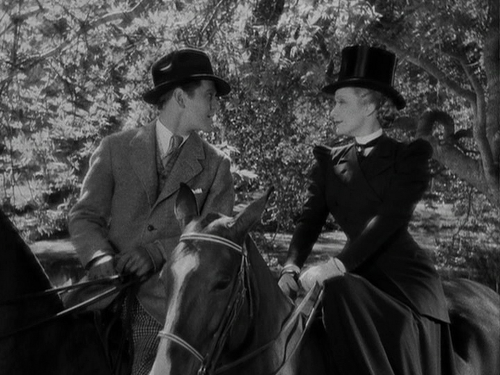 |
| Riding sidesaddle isn't the only lesson that Von Prell teaches Lily |
America and the rest of the world, however, would have to wait until after Dietrich
blossomed into womanhood to see her equine ethos. Although that meanie
Josef von Sternberg nipped public demand
in the bud by instead putting Marlene on boats, planes, and trains, Rouben
Mamoulian finally answered fan magazine prayers, directing Dietrich in the 1933 foalsome
flick, The Song of Songs. As the protagonist Lily Czepenek, Dietrich got the
ride of her life. Biographer Charles Higham relayed old newspaper reports that
on March 28, 1933, Marlene‘s sidesaddle excursion with her costar Hardie Albright
(as Walter Von Prell) abruptly ended with a concussion when a snake spooked her horse, which threw
her headfirst to the ground. On Ebay, you can currently buy an issue of The San
Francisco News that includes a blurb about this incident.
Whether Paramount publicity was fibbing to build the buzz around this movie, I
don’t know, but I do know that the possibly Slavic Lily makes impressive headway
in her informal finishing school to become a model German aristocrat, wielding a whip in such a way that contemporary moviegoers with minds as dirty as mine can't help but detect a hint of S&M. Who would
have thought that Dietrich’s first Pygmalion-like role would be with Mamoulian,
not Sternberg?
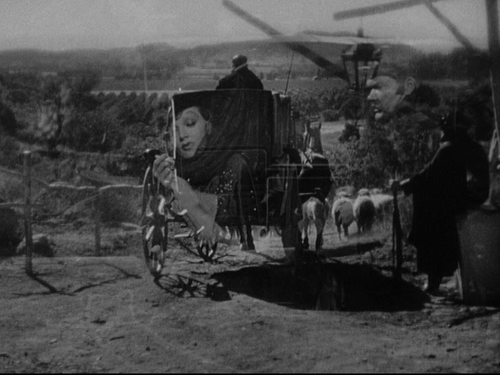 |
| You know, Concha used to work in a cigarette factory. |
While horses add to the genteel Central European atmosphere in The Song of
Songs, they are the props of conspicuous consumerism and inept authority in the
Spanish setting of 1935's The Devil Is A Woman. Dietrich played a cigarette factory worker
named Concha Perez, who somehow acquires the means to travel by horse-driven parade
float and carriages. The tricorn-capped officers of the Guardia Civil also ride
horses throughout this film, somehow failing to prevent the illicit exploits
around them. Just because characters can travel with horses doesn‘t mean they
had in fact possessed the status and authority embodied by these animals.
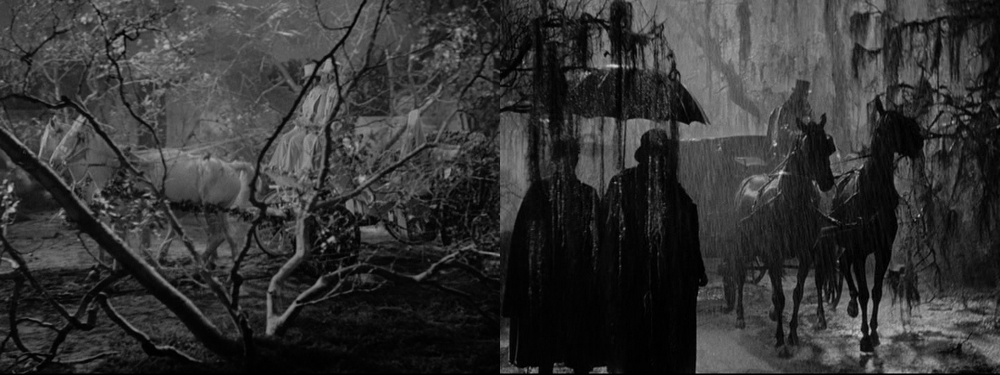 |
| Sternberg's smoke and mirrors were branches and rain. |
If you don't think 1941's The Flame of New Orleans should be included in my Europeans group, please let me know. The movie's depiction of slavery is the elephant in the room that makes me question my classification system, but the New Orleans culture depicted in this movie is distinctly French, perhaps thanks to the direction of the un-Americanized Rene Clair. Plus, we learn from Clementine (played by Theresa Harris) that she and her mistress Claire Ledoux (Dietrich) have traveled extensively throughout Europe, which makes me wonder whether they in fact came from Europe. To support this possibility, Claire is apparently a countess, and titles of nobility in this movie's setting would have to be of European origin. Another very European element is Zolotov, a Russian caricature whom Mischa Auer played in many other movies, including Destry Rides Again.
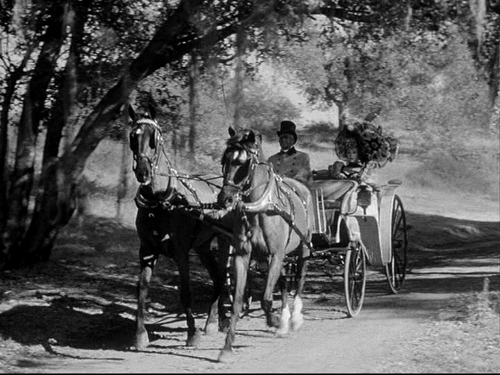 |
| This is no ride through the park! |
Rather than carry on about the movie's European traits, I'll get to the crux of this discussion--the horses. Throughout the movie, we see characters in horse-drawn carriages, but I want to highlight one particular scene--Charles Giraud's failed attempt to prove his heroism to Claire on her ride through the park. Giraud (played by Roland Young) intended to win Claire's favor by stopping his henchman from "assaulting" her. Thanks to Clementine, Claire was in on the plot and thought she was playing along, but fate took her on a detour, with a monkey tangling itself around her carriage's back axle. When Robert Latour (Bruce Cabot) tried to extricate his simian friend, Claire assumed he was part of Giraud's scheme and demanded that her driver Samuel (Clarence Muse) steer ahead, leading to an unexpected muddy altercation. No horses appear to have been harmed because a warier Claire and Samuel continue their ride, evading Giraud's actual henchman with the flick of Samuel's whip.
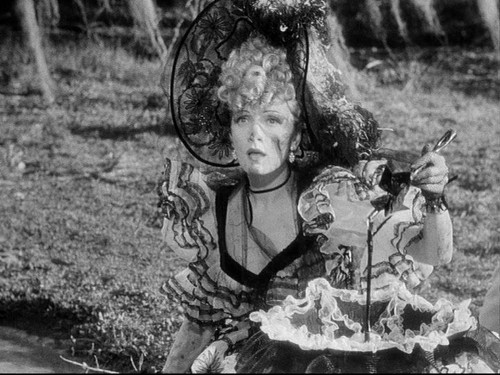 |
| Deep down, Claire likes it rough like Lily |
Well, I've had enough and am about ready to hang up my stirrups. I'll get to the WTF group in another post!
*If you didn't get the joke or didn't find it at all funny, my apologies! I was mocking Dietrich's comments in the Maximilian Schell documentary about her silent film resume.







Re Song of Songs: no one looked more beautiful in a severe black riding habit than Dietrich in that!
ReplyDeleteBonjour, gentil chevalier.
ReplyDelete"Un jour d'octobre, Marlène sautait une haie. Son cheval, un arabe incorrectement dressé, se déroba dans l'instant même qu'elle l'enlevait pour franchir l'obstacle. Désequilibrée, l'amazone tomba. Un agent la ramassa, la ramena chez elle. Elle avait le poignet droit foulé.
— Elle ne pourra pas jouer de violon pendant plusieurs mois, dit le médecin qu'on avait appelé. Et jamais elle ne retrouvera toute sa souplesse..
Marlène, ce soir-là, pleura beaucoup."
Jean Lasserre, "La vie brûlante de Marlène Dietrich" (p.42, 1931).
On ne se moque pas du titre ! Il y a au moins un effort de création. Une des premières biographies de Marlene... Croyons la légende et disons-nous que si nous avons eu le malheur de perdre une grande violoniste, nous avons le bonheur incomparable d'avoir gagné un mythe cinématographique.
Nous comprenons le regard paralysant qu'elle lança à son pauvre cheval dans "The Garden Of Allah". Un si mauvais souvenir...
J'aime beaucoup "The Song Of Songs". Mamoulian a de la technique, j'aime bien le kitsch et il y a plusieurs films en un. La pauvre-orpheline-innocente-victime-d'une-tante-trop sévère, la baronne-riche-et-malheureuse et la chanteuse-de-cabaret-un-peu-cynique-mais-au-coeur-d'or... Que demander de plus ?
Il y a un gros problème dans "The Flame Of New Orleans" : Bruce Cabot...
Merci, Fabrice.
Joseph, your place is an amazing source for information about Dietrich. I'm taking notes about your tips! And the horse in Song of the Songs is really gorgeous!
ReplyDeleteI really hope you to come back to my blg anytime soon. About Brazilian classic movies, there is one, called Limit, form 1930, that was poduced by F. W. Murnau. It's quite rare and I really want to look for it in my next vacation. Other classics come from the 1960's, such as Black God, White Devil and The Payer of Promises, this one the winner of the Cannes Palme D'Or 50 years ago.
Greetings!
In my haste and inability to make screen captures, I forgot to mention Angel (which I own on VHS!) and Knight Without Armor (which won't play on my laptop), both of which were released in 1937, feature horse races, and provide Dietrich with an aristocratic lead role. Thus, the relationship between European nobility and horses appears in these movies, too.
ReplyDeletebitter69uk, it's my favorite look of The Song of Songs. I'd like to see images of other actresses on horseback with this look, too.
ReplyDeleteFab, je prefere cette legende a la realite banale sur quelque ganglion! Un gros probleme dans The Flame of New Orleans? Je dirais un probleme laid, mais notre Graal a souffert avec ces types dans tant des films. Je ferme les yeux quand je regarde les close-ups d'Edward G. Robinson dans Manpower.
Le, thank you for your kind words! You will be in for a treat when I write about The Scarlet Empress and Golden Earrings because these movies heavily feature horses. Thanks for your Brazilian classic movie tips, too. In Los Angeles, there is an annual Brazilian movie festival that's coming up with recent movies that I'd be interested in watching, but I would rather get a bigger context of Brazil's movie history by watching older features.
Madonna, of course, is a keen student of Dietrich. On her Confessions on a Dance Floor tour a few years ago now her big opening number had an equestrian theme and she wore a riding habit and hat that definitely seemed to deliberately reference Dietrich’s Song of Songs outfit.
ReplyDeleteIf you mashed up that Madonna look with her Edwardian look for her Girlie Show Tour "Justify My Love" performance, then we'd have a worthy homage. To me, Madonna was merely beating a dead horse by poking fun at her riding accident in that Confessions opening, but--who knows?--she certainly could have pinched the look from Dietrich, too.
Delete